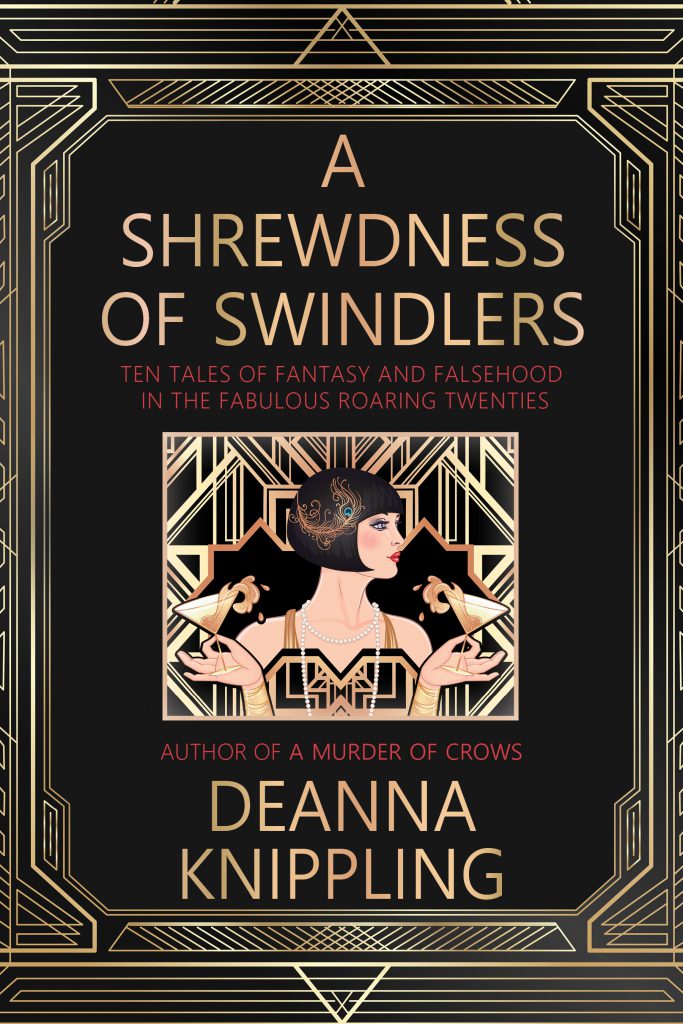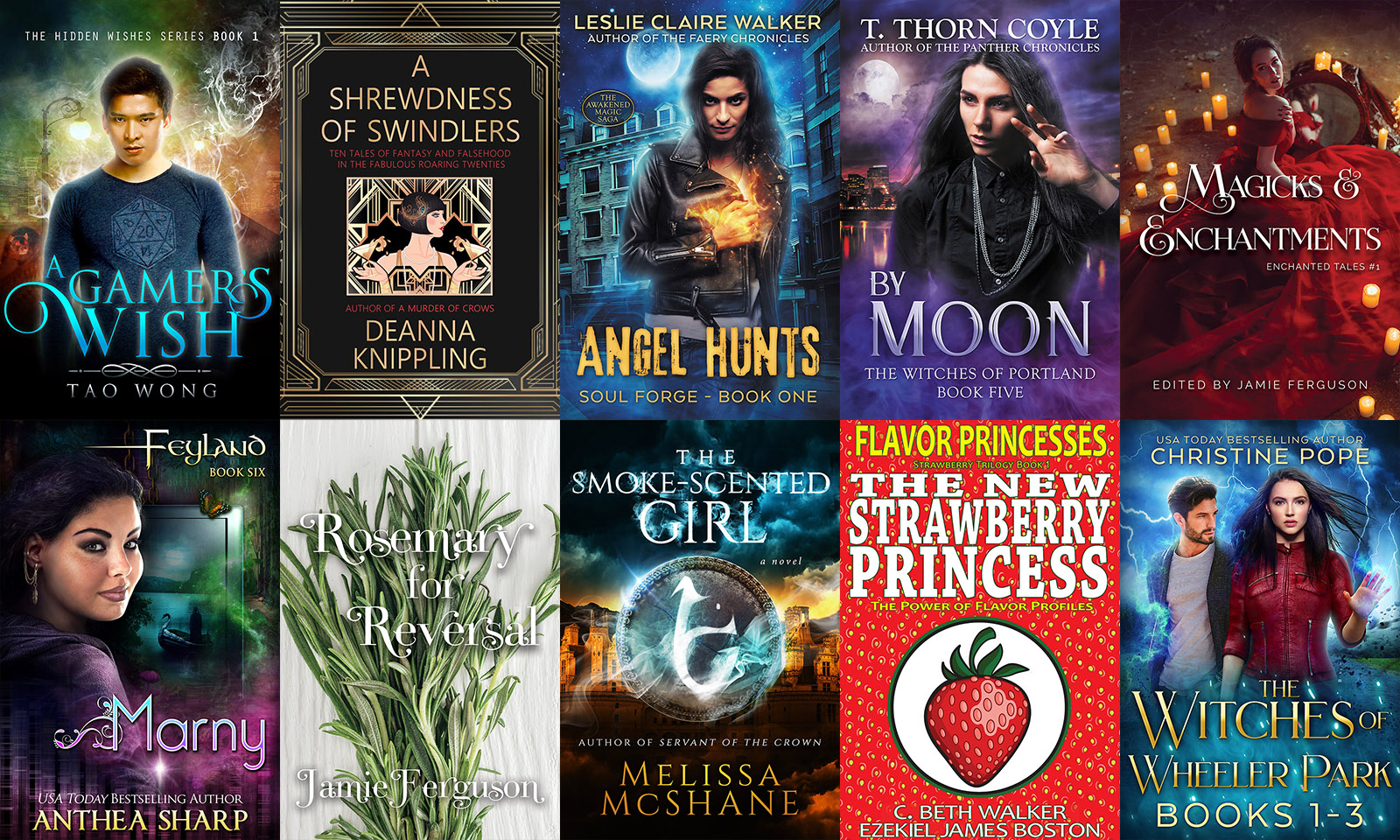Dames, detectives, and deception…magic meets the decadence of the Roaring Twenties in ten tales of glitter and jazz.
The year is 1929. It’s two months after the financial collapse on Wall Street, and the world is bating its breath, unsure of what will happen next. Is it the end of an era?
At the Honeybee’s Sting, a speakeasy in the basement of a laundry, a group of unusual figures meets to discuss the past—and perhaps some possible futures: the Detective turned writer, the Dame who’s older than she looks, the Vampire who’s been riding the financial markets for generations, the Spy from across the ocean, the Actress who’s only just learned the truth about Hollywood, and more.
But one of their number is missing, a man connected to the mob, a man who holds the prize for a mysterious storytelling contest—a prize that can give you your heart’s desire.
Ten stories, woven together in the style of The Canterbury Tales, follow the contest along a long, dark night where nothing is what it seems and the best way to tell the truth is to lie.
Pour yourself a cocktail and join us at the liar’s table for the divine, the slapstick, the tragic, the transcendant 1920s today!
A Shrewdness of Swindlers is available for a limited time in the Wild Magic bundle.
There’s the real world…
…and then there are our worlds, secret, wild, and free.
The Wild Magic bundle holds ten volumes of the magic. Ten books about what we find after we have passed through the illusion that we can live without wonder in the world, and come out the other side.
Pack your bags, put on your good walking shoes, and make sure you bring plenty of water. We’re going out into the wilderness, and who knows when we’ll be back?
The Wild Magic bundle is available through July 14th, 2021.
Excerpt
Ala patiently explained to me what would happen when the witch arrived. In great detail.
First, the witch would arrive in a traveling house or hut. It could be on walking chicken legs, or it could appear down the street, hidden amongst the other houses. I would know the witch’s house by the bones, Ala said. Either the house would be made out of bones, or it would be decorated with bones. Sometimes the bones would be disguised, and sometimes they would be made up with strings, sticks, and hollowed-out, painted eggs into a kind of windchime that witches used for casting spells.
Second, she would have bony legs. All witches, Ala asserted, had bony legs. If someone accused of being a witch had fat legs, well, that person wasn’t a witch. They could have a fat middle, even a fat face and fat arms, but their legs would be like sticks.
Third, a witch will always give you the chance, if you ask, to do three tasks for her. If you are asking her a favor, three tasks. If you are trying to escape her wrath, three tasks. The tasks are always impossible. The only way to win is not to play. Or you can cheat. In fact, the only times that Ala and Elias had heard of someone getting anything out of a witch was by tricking her somehow. Say a witch asked someone to bring her the moon. You would cup your hands full of water dyed with ink, so that the ink would shine like a mirror. And then you would stand under the moon and say, “I brought you the moon, now you only have to take it.”
I immediately thought about hiring a lawyer. This witch stuff sounded like lawyer-talk to me. But they said no, a lawyer wasn’t going to help.
If you complete the three tasks, they said, then the witch has to do whatever you asked of her. You can’t make her a slave or anything. But you could ask her to kill someone, or give you a magical trinket that would make your fortune, or turn you beautiful, or let you go, or whatever you wanted. If you didn’t, though, she would eat you.
Eat me, that was, if I dared helped Ala and Elias get out of their servitude.
—from A Shrewdness of Swindlers by DeAnna Knippling
The Interview
A Shrewdness of Swindlers takes us back to 1929, where a group of liars, cheats, and thieves meet to compete for a stolen treasure by telling tales. Each of these tales is a separate story in the book. What inspired you to create this collection?
I was inspired by a specific book, The Big Con: The Story of the Confidence Man, by David W. Mauer. The author, a professor of linguistics, interviewed a ton of con artists about the slang they used, and ended up with so many good stories that he wrote a book spelling out how cons worked. Not that that stopped anyone from getting conned, of course.
My favorite part was the author noting that cons actually get conned a lot (although not by the same trick they use) and end up rarely keeping hold of their conned money. It’s almost like the insight into who makes a good victim comes from being exactly the same kind of person.
The book is set in the 1940s, though. What inspired me to move it earlier was that I really just like the 1920s better! I’ve definitely done more research on the 1920s. I decided after reading The Big Con that I could probably get at least a half-dozen stories out of the idea of conning or fooling people in the 1920s, and mentally bookmarked those stories for a future collection as I wrote them. I was trying not to write stories in the same subgenres, but they ended up mostly tinged with fantasy elements.
What folklore did you incorporate in the Dame’s tale, “Myrna and the Thirteen-Year Witch,” and how did you modify it to fit the setting of Hollywood in the 1920s?
Oh, that’s the Baba Yaga story! She comes from Slavic traditions. Whenever someone asks Baba Yaga for a favor, she gives them a deliberately impossible task, like finding a blue rose. She also has a hut that has chicken feet; I put the house in there as a Spanish mansion.
A friend made a suggestion about turning some of the supernatural creatures into things they normally wouldn’t have been—I think he mentioned turning dragons into trains—and I liked that idea, too. In Slavic fairy tales, characters are always getting transformed into something else. Why not change them into machines? It’s a cruel form of slavery, which made me think Baba Yaga would be in favor.
In the Actress’ tale, “The Page-Turners,” the book the protagonist accidentally ends up used to be a person. How did you come up with the idea, and what did you most enjoy about writing this story?
Er, well. At the time I was working my way through a list of horror novels and read The Book of Human Skin by Michelle Lovric. The book ended abruptly and my imagination just kind of carried on trying to sort out the story and how I felt about it. In the end I went, “Murder is like killing someone so you can overwrite their story.”
About the same time, I ran into a trailer for the movie Europa (also called Zentropa) by Lars von Trier. I’d seen the movie years before but it had stuck with me—it’s a second-person point of view movie, with Max von Sydow hypnotically narrating the tale. So I decided to write a second-person point of view story. I’ve written them before and I like writing them.
But my favorite part was researching Anna May Wong, a Chinese-American actress who was one of the first to adopt the “flapper” look and who almost broke into top-tier Hollywood stardom. When things fell through for her due to racism, she toured China for a year. Eventually she starred as a detective in her own show, but the episodes weren’t preserved and are lost now, sadly. The idea of an artist who was held back, not because of her own lack of talent but because of outside forces, who then pivots to something with more depth, that resonated with me.
Why do you think so many people are drawn to reading stories about magic?
On the one hand, I think we all have some unhealthy coping mechanisms. Stories about magic generally tell us that, at least for a little while, there’s a workaround for reality. The dead are brought back to life, injustices are overturned, the impossible becomes reality, mostly because you wish it so. I feel like the stories that are most heavily anchored in magic systems are really invested in this concept. Like, “If you follow the rules of magic, you don’t have to follow the regular rules.” People say that if you’re going to write a magic system, you have to put a price to the magic; otherwise, it’s getting something for nothing, but if you pay a price, then you get the “right” to change reality.
I mean, I’m gonna criticize that sort of story, but I love that sort of story, too. It’s like these stories are complex con jobs. “If I could just fool reality for five minutes…”
On the other hand, I feel like stories about magic are also good ways to create stories about our values and beliefs. There are things we each deeply believe in that have no basis in fact, but that we believe in order to cope with reality and with being human. Sir Terry wrote about those things a lot, and I’ve always admired him as a writer. I like those stories a lot, too. I think they speak to our craving for meaning. Why do bad things happen? Why is there death? What will the world be like, after I am gone? What was this all for? Not so much myths about the universe as answering questions like, “Was the important thing all the pain in the ass paperwork I filled out for my job? Or what I felt like when I looked out over the ocean? Or…both?”
Writing Craft Volume 1 is your first book on writing and publishing fiction; you’re working on the next book now. Why did you create this series, and what have you learned from it yourself?
I’ve been trying to organize my thoughts on how to write for years on my blog. I finally got to a point where I saw this meme going around Facebook that said something like carry yourself with the confidence of a mediocre white man on the same day that some mediocre white man was going off about his book about writing and how great it was, etc., etc., and how he’d written over a dozen books. I’d written over seventy by that point.
Another meme that I find inspiring is I do all things through spite, which strengthens me.
The Magicks & Enchantments anthology includes your short story “The Coffee Shop Ghost.” Why did you decide to have the main character be able to smell spirits?
I went to the coffee shop where the story happens and it smelled weird that day, like an electrical fire. I was journaling, and wrote down that the building must be possessed of a ghost made out of smells. Then I went, “You know what would be funny? Is if there was a name for the talent of being to smell out ghosts. Smell-o-mancy.” One Google search later, I had an idea for a story.
I wrote the first half of the story or so at the coffee shop. I’d been to the bar next door before that, too, but didn’t write there.
What are you working on now, and what’s fun about what you’re writing?
I just finished a short story set in the same world as one of the stories in A Shrewdness of Swindlers. The story in the collection is “All the Retros at the New Cotton Club,” and it’s about a future version of the 1920s where what’s being bootlegged aren’t alcoholic spirits, but AIs based on the dead, called “retros.” The new story is called “Be Careful What You Steal” and it’s set in the same world but different characters and gets into the backstory behind the technology that created the retros.
I’m also working on a space opera novel called The House of Masks that’s a combination of all my favorite melodramatic opera things, from Moulin Rouge to Repo: The Genetic Opera to The Phantom of the Opera, with some Dickens and Aliens movies thrown in. It’s the longest project I’ve ever worked on, though, so sometimes I take breaks 🙂
About DeAnna
DeAnna Knippling has written over 70 novels across multiple genres for herself and her ghostwriting clients. But what she writes for herself are historical gothic fantasy and horror novels about characters who free themselves from monsters—somehow. Haunted houses, mysterious bumps in the night, twisted family dramas, hidden passions, and secret hopes populate her works.
Find DeAnna
Website ~ Facebook ~ Twitter ~ Instagram ~ Pinterest ~ Goodreads ~ BookBub ~ Patreon
Find the Wild Magic bundle!
The Wild Magic bundle is available for a limited time at StoryBundle.com/Fantasy.
Bundle buyers have a chance to donate a portion of the purchase price to the charities Mighty Writers and Girls Write Now.

Sign up for the Blackbird Publishing newsletter!


